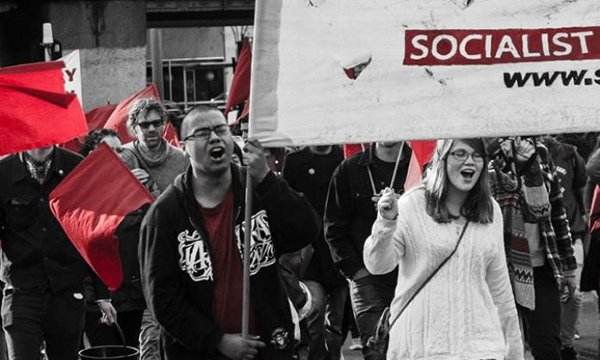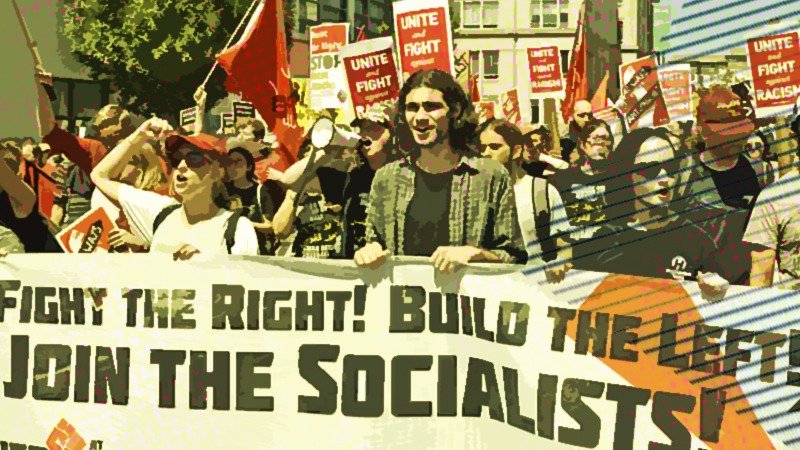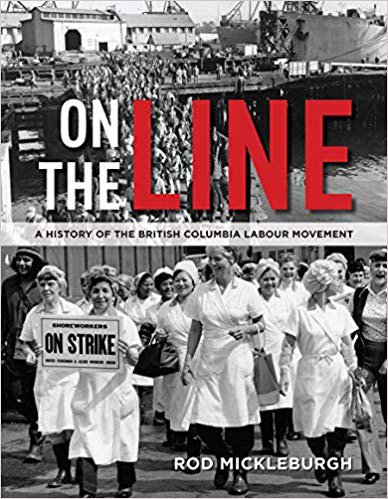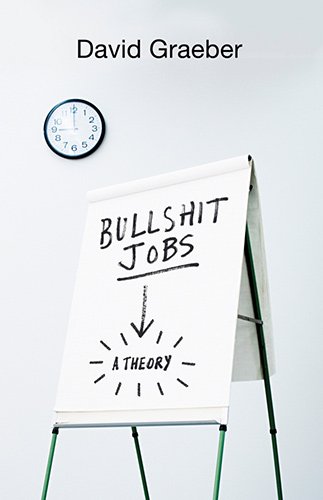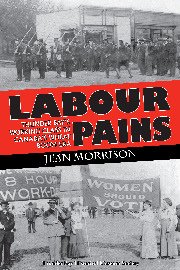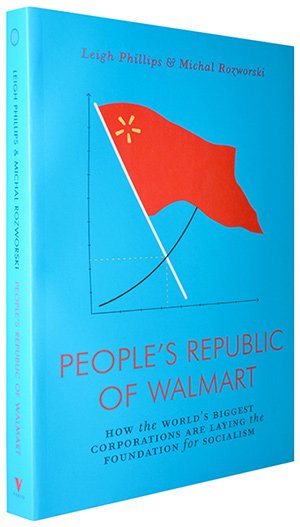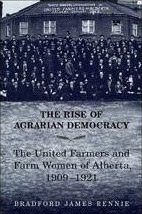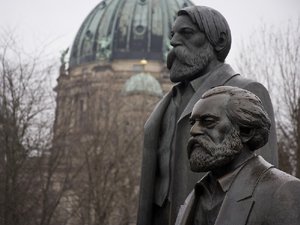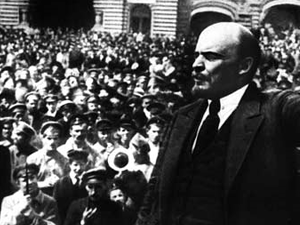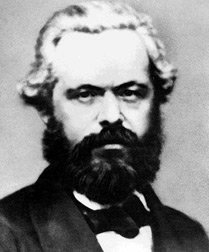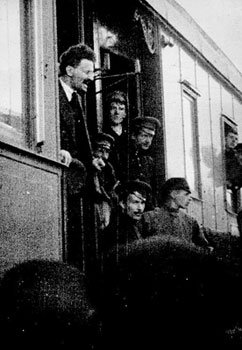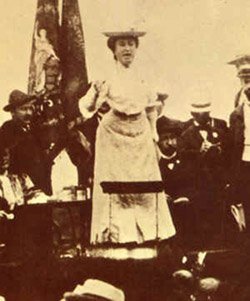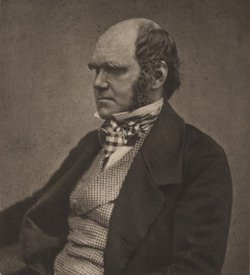A Network of Canadian Socialists
Socialists face a conundrum: increasing numbers in the West today say they identify as socialists, but revolutionary socialists remain confined to small groups with little influence, and one of the most important in the US has just dissolved.
In 1981-82 I attended two ISO conferences where American comrades grappled with the need for a fundamental change in methods and, ultimately, leadership in the face of a radical decline in militant struggles. The result was a new leadership committed to a student focused, more propaganda oriented socialist group.
On The Line is an account of BC trade unions by the BC Labour Heritage Centre (an offshoot of the BC Federation of Labour) written by retired Vancouver Sun labour reporter Rod Mickleburgh. In a well illustrated and lively manner he tells the story of workers’ organizations and struggles, from Vancouver Island Coal miners in the 1850s to teachers’ struggles today.
In his colourfully titled new book Bullshit Jobs: A Theory, David Graeber expands on an argument he first made in a 2013 essay that first appeared in Strike! That essay, called “On the Phenomenon of Bullshit Jobs,” went viral over the internet so quickly that the original web page received over a million hits and crashed the Strike! server.
This is a study of working class formation. In particular, it is the story of the most advanced Thunder Bay (then Fort William and Port Arthur) workers from the 1880s to World War One as measured by such forms of autonomous institutional completion as trade unions and political parties.
Phillips and Rozworski argue – and demonstrate in The People's Republic of Walmart – that economic life can be organized to meet needs rather than profit by planning through a democratic socialist state.
History
On The Line is an account of BC trade unions by the BC Labour Heritage Centre (an offshoot of the BC Federation of Labour) written by retired Vancouver Sun labour reporter Rod Mickleburgh. In a well illustrated and lively manner he tells the story of workers’ organizations and struggles, from Vancouver Island Coal miners in the 1850s to teachers’ struggles today.
The Rise of Agrarian Democracy is the story of how Alberta farmers built a movement that elected the longest lived experiment in farm populist government in North America—the United Farmers of Alberta (UFA) from 1921 to 1935. B.J. Rennie’s aim is to tell and analyze how this mass mobilisation arose through the development of “a movement culture” in three steps.
The Communist Manifesto is the founding statement of the revolutionary socialist tradition. In it, Engels and Marx set out a political method that emphasizes capitalism's dynamism and volatility; the need to relate to the exploited and oppressed in the struggle for socialism; to differentiate revolutionary socialists from other political alternatives; and to inspire a struggle for a socially just and fully democratic world. In the following essay, we examine how Marx and Engels saw the evolution of the Manifesto and its various uses in the struggle against capitalism in the last 160 years.
The delegates were gripped with immense enthusiasm at the birth of the first workers’ republic in the history of humanity. In the words of American journalist John Reed: “by common impulse we found ourselves on our feet, mumbling together into the smooth unison of the Internationale.” Arise ye workers from your slumbers! Arise ye prisoners of want!
Socialist Theory
Is Populism a descriptor for someone else’s class politics, an adjective, or is it a noun, a political alternative in and for itself?
The Communist Manifesto is the founding statement of the revolutionary socialist tradition. In it, Engels and Marx set out a political method that emphasizes capitalism's dynamism and volatility; the need to relate to the exploited and oppressed in the struggle for socialism; to differentiate revolutionary socialists from other political alternatives; and to inspire a struggle for a socially just and fully democratic world. In the following essay, we examine how Marx and Engels saw the evolution of the Manifesto and its various uses in the struggle against capitalism in the last 160 years.
The delegates were gripped with immense enthusiasm at the birth of the first workers’ republic in the history of humanity. In the words of American journalist John Reed: “by common impulse we found ourselves on our feet, mumbling together into the smooth unison of the Internationale.” Arise ye workers from your slumbers! Arise ye prisoners of want!
For Marx social class is at the centre of understanding and organizing social change. As interpreted by Lenin, the working class, organized by its politically advanced vanguard, constituted the path toward emancipation and the realization of human potential. Rosa Luxemburg emphasized—among other things—the critical power of the combined force of the working class, engaged in a general strike, in overthrowing capitalism.
Socialist ABCs
It’s not often that the ideas of Karl Marx are discussed in the prestigious pages of the British Journal of Dermatology, but an article published there in January 2008 attempted to throw light not just on Marx’s state of physical health, but also on its supposed consequences for his entire worldview.
August 2010 marked the seventieth anniversary of the assassination of Leon Trotsky at the hands of a Stalinist agent. Here we reprint an article by British Marxist Duncan Hallas on the life and legacy of Trotsky.
Rosa Luxemburg’s Accumulation of Capital was timely when it was published in 1913 and reads like a contemporary book today. Concluding her analysis of capitalist accumulation and imperialism, she forecast ‘a string of political and social disasters … punctuated by periodical economic catastrophes’.
Charles Darwin’s masterwork, On the Origin of Species, was published in November 1859. It initiated a revolution in science that continues to this day.
Socialists face a conundrum: increasing numbers in the West today say they identify as socialists, but revolutionary socialists remain confined to small groups with little influence, and one of the most important in the US has just dissolved.
In 1981-82 I attended two ISO conferences where American comrades grappled with the need for a fundamental change in methods and, ultimately, leadership in the face of a radical decline in militant struggles. The result was a new leadership committed to a student focused, more propaganda oriented socialist group.
On The Line is an account of BC trade unions by the BC Labour Heritage Centre (an offshoot of the BC Federation of Labour) written by retired Vancouver Sun labour reporter Rod Mickleburgh. In a well illustrated and lively manner he tells the story of workers’ organizations and struggles, from Vancouver Island Coal miners in the 1850s to teachers’ struggles today.
In his colourfully titled new book Bullshit Jobs: A Theory, David Graeber expands on an argument he first made in a 2013 essay that first appeared in Strike! That essay, called “On the Phenomenon of Bullshit Jobs,” went viral over the internet so quickly that the original web page received over a million hits and crashed the Strike! server.
This is a study of working class formation. In particular, it is the story of the most advanced Thunder Bay (then Fort William and Port Arthur) workers from the 1880s to World War One as measured by such forms of autonomous institutional completion as trade unions and political parties.
Phillips and Rozworski argue – and demonstrate in The People's Republic of Walmart – that economic life can be organized to meet needs rather than profit by planning through a democratic socialist state.

